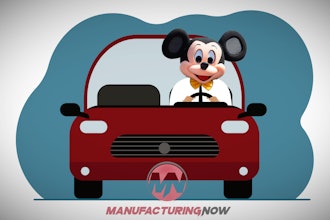Many cite the highly lauded Toyota Production System (TPS) as the source of Toyota’s rise in the automotive industry. But there is much more to the company’s success than its cost-effective production process.
Given full access to Toyota, Professors Emi Osono, Norihiko Shiizu, and Hirotaka Takeuchi at the Graduate School of International Corporate Strategy, Hitotsubashi University in Japan conducted a six-year study of the company that included visiting facilities in 11 countries, attending numerous company meetings and events, analyzing internal documents, and conducting 220 interviews with former and existing Toyota employees, ranging from shop floor workers to Toyota President Katsaki Watanabe.
The authors’ study of the company revealed that while TPS was a "hard innovation" that contributed to the company's growth, the company also mastered a "soft innovation" that works in tandem with TPS. Toyota's culture of contradictions is just as key to the company's success as TPS.
Manufacturing.net talked with Emi Osono co-author of Extreme Toyota about the findings.
Mnet: How is Extreme Toyota different from other books about the automotive giant?
Osono: We identified in our book three forces that drive Toyota’s expansion, which are impossible goals, local customization and experimentation. Three other forces, which are the founders’ philosophies, Toyota’s “nerve system” or communication network, and “Up-and-in” human resource management, weave the company together and keep it from spinning out of control. We called them “integrative forces.”
Mnet: Explain Toyota’s philosophy of Genchi Genbutsu. Why is this important to its success?
Osono: Genchi Genbutsu means to go to the front line and see it firsthand. Toyota people -- from executives to front line workers -- go and visit dealers, customers and factories to understand the situation, needs, problems and the background. It helps Toyota to understand reality better and supports its communication and problem solving capability. It helps Toyota to develop cars that better respond to customer needs, dealer management that better responds to dealer needs, and an operations management system that better responds to the local condition of each manufacturing site. It’s important that the very top managers at Toyota practice Genchi Genbutsu, which enables everyone to face reality squarely with his or her own eyes.
Mnet: Given the recent lack of demand for trucks and SUVs that has lead to a decline in automotive manufacturing, how is Toyota able to remain successful while maintaining its philosophy of keeping its employees?
Osono: Toyota recently announced they will stop the production line in three U.S. factories for three months. Nikkei Newspaper in Japan reported that Toyota will keep the 5,000 workers affected by this and put them in training programs and/or kaizen activities.
We think this is typical Toyota -- try not to let go of its people, then consider what it should do to improve efficiency and adapt to environmental change. It’s another indication that Toyota sees people and the knowledge that is embedded in them as the key resources.
Mnet: Keeping employees even during a time when most automakers are struggling is part of the ‘contradictions’ Toyota is known for. Why is it important for companies to embrace contradictions?
Osono: Many companies face contradicting challenges. For example, companies are required to be effective and efficient to be competitive in the short term, yet at the same time they must invest enough for the future. Well-managed companies can do both.
Mnet: How is Toyota able to master this?
Osono: Toyota considers contradictions as way of life. It has problem solving capabilities to tackle the challenge of dealing with contradictions without making compromises or choosing “either-or.”
Mnet: Creating a culture, particularly one that is based on contradictions, is not easy. What advice can you offer manufacturers wishing to transform to the Toyota Way?
Osono: In Extreme Toyota, we made three suggestions: First, embrace the contradictions and try to achieve the contradicting challenges. Second, train people with problem solving skills. Third, be open minded.
Mnet: What characteristics of Toyota executives should other managers emulate?
Osono: The first is being humble. Being humble, people can admit there is a room for improvement. Being humble, people can be more open to different perspectives and opinions.
The second is the firm belief in each individual’s capabilities. Toyota’s commitment to educate and develop employees and its executives’ sincere listening attitude are based on this shared belief.
Mnet: Why is it difficult for manufacturers, especially automakers, to emulate Toyota?
Osono: For one, Toyota’s strength is systemic, that’s why it is difficult to emulate. It is systemic because it involves various factors of management such as resource allocation policy, human resource management, leaders’ roles, decision making processes, problem solving skills, communication networks, and shared values and philosophies.
For another, Toyota sees the auto industry as a knowledge industry and puts people at the center of everything. Other auto companies see the auto industry as a manufacturing industry.
Mnet: With so many companies trying to copy Toyota’s process, why does Toyota not view this as a threat and keep their processes more closely guarded?
Osono: When I asked this question to one of the executives at Toyota, he answered that Toyota would try to stay ahead of others by continuously improving its own capabilities.
Mnet: What company would you say has come closest to emulating Toyota?
Osono: If ‘emulating Toyota’ means developing a company that respects people’s capabilities and develop management practices that improve their capabilities and utilize them, then GE, 3M, Honda, Bandai and Google come to mind.
Mnet: As Toyota continues to expand, will following their current process become more challenging?
Osono: Yes, we listed our concerns in Chapter 10 of our book. Most of Toyota’s growth in the past several years came outside of Japan. The increase in employees also took place outside of Japan. Toyota has been extremely good at sharing philosophies, educating its employees with its problem solving processes and emulating its unique management practices. Toyota has to extend its efforts around the world and become keenly aware of the workforce diversity issue.
Emi Osono, co-author of “Extreme Toyota: Radical Contradictions That Drive Success at the World’s Best Manufacturer,” is a business school graduate from The George Washington University and a professor at one of Japan’s top business schools, Hitotsubashi University, Graduate School of International Corporate Strategy. www.ics.hit-u.ac.jp





















